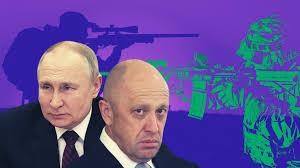AFTER THE BETRAYAL, WOULD WAGNER REGAIN ITS ROLE?

By General Monzer El Ayoubi
Translation: D.Pierre A. Sarkis

There is no doubt that the death of the founder and head of the Russian paramilitary organization Wagner, Yevgeny Prigozhin, was not delayed, but rather expected by many observers, after leading a rebellion following the accumulation of time-related drawbacks of nearly a year, along with field-related ones. These drawbacks were linked to the performance of the Ministry of Defense and the eligibility of the command, as well as, their failure to respond to the logistical requirements of his forces during the military operations in Ukraine, especially regarding the seizure of the strategic city of Bakhmut, in Eastern Ukraine.
To start, Prigozhin stated to the media the return of a large part of his forces to Russian territory heading towards the capital Moscow, in what looked like a military coup after taking control of the city of Rostov, stressing his refusal to retreat and surrender. In parallel, Russian President Vladimir Putin was following events calmly and in cold blood from the command and control room of the presidential residence with Defense Minister Sergei Shoigu and Chief of Staff Valery Gerasimov, recalling in seconds some of Tzarist Russia’s history when one of the early Tzars nicknamed Ivan the terrible, executed one of his prominent army commanders, Prince Andrei Kurbsky, after his betrayal by joining Poland in 1564 during the Livonian War, known as “the Phoney War”, allowing the Wagner convoy to travel about 750 km on the M4 highway, bypassing the city of Voronezh after taking control of its military installations. 200 km from Moscow’s doorsteps was enough for two Kamov Ka-52 Alligator helicopters to fly at low altitude and bombard the advancing column with missiles, killing more that 30 people and leaving a large number wounded. At these critical moments, Belarus President Alexander Lukashenko entered the scene to address the crisis, as President Putin delivered an extraordinary televised speech in which he described the armed rebellion of the Wagner Group as “treason” and “treachery”, asserting that “anyone who takes up arms against the Russian Army will be punished.”
In context, the coup attempt did not last more than 24 hours as Lukashenko’s mediation resulted in security guarantees obtained from his ally Putin, which allowed the transfer of Prigozhin and his men to Belarus on condition that the Wagner Group hand over its heavy equipment to the Russian Army. The door was left ajar for fighters who participated strongly in the fighting in Ukraine, giving them three choices: signing with the Ministry of Defense working under the command of the Russian Army; leaving for Belarus; or, returning to their homes and families.
On the other hand, if forgiveness is an honorable thing, its limits to the Russian President are treason and betrayal, when the killing of Wagner leader Yevgeny Prighozin prompted the media to re-extract a previous press interview with Russian President Putin dating back to 2018, in which he confirmed in response to the question of his interlocutor, his ability to forgive “but not everything”, excluding what cannot be forgiven “the crime of treason.’
From a perspective that cannot be ignored, the crash, or the downing of the Prigozhin Embraer-110 plane during its domestic flight from Moscow to St. Petersburgh led to conflicting or multiple possibilities of the causes of the accident: planting a bomb on the plane during its stop at the capital’s airport Sheremetyevo; technical malfunction or emergency malfunction; targeting it with a surface-to-air missile, as well as, the identity of the perpetrators and the powers of the beneficiaries; Western or Ukrainian intelligence services; Russian security; the involvement of agents within the Wagner Organization leading to Prigozhin’s demise along with his assistant Dmitry Utkin along with three pilots and seven escorts, which will not facilitate the course of the investigation. Nor will be a page smoothly turned from the reality and composition of the arms of the military structure of the Russian leadership, as well as, his memory in the conscience of his supporters.
Next, in the theory of legitimate suspicion, the GRU of the Russian General Staff is suspected two months after the failed coup attempt. As for denial of suspicion, there are few of many: the punishment of Prigozhin had already been imposed through his exclusion from the military operation in Ukraine, followed by a large number of his men becoming under contract with the Ministry of Defense, forcing his exile to the state of Belarus; the diminishing confidence in the military institution and its ability to address mistakes in accordance with military laws; the airspace in which the plane was flying within at the moment of its fall was exposed to Ukrainian drone attacks on Russian territory; Belarus President Alexander Lukashenko was deceived by the guarantees of the Wagner leader’s exit agreement, of not being vulnerable to attack after the end of the revolution; create the right circumstance for President Putin to be depicted relentlessly as the butcher Ivan the Terrible. A number of questions arise, not the least of which, is the fate of Wagner and the continuity of its tasks. Who will succeed its leader and its authority? What happens to its theater of operations and the Russian role in Africa and different regions of the world? What will be the repercussions of its presence in Belarus and the deployment of its forces on the border of Poland contiguous to NATO forces?
Reflecting a Western intelligence perspective, Sky News military affairs analyst retired General Sean Bell considers Wagner without Prigozhin “nothing.” On the other hand, within precise powers coordinated with the Ministry of Defense for containment purposes, President Putin will not delay in appointing retired Colonel Andrei Troshev, who has military experience and the title of Hero of the Soviet Union, to lead the organization. The organization will also continue its missions on the African continent without reducing its role in the Ukrainian War, in internal conflicts, in French evacuation, and in American assimilation. In parallel, for fear of skirmishes or border breaches, Poland and the Baltic States of Lithuania, Latvia and Estonia, demanded that Belarus President Lukashenko expel the mercenaries of the Wagner Military Group immediately, at the time that the military leadership in Minsk is working on increasing the number of soldiers of the organization, with the goal of training them and raising their level of combat efficiency.
From changing geopolitical perspectives and the foundations of strategic interests, along with maps of influence, enemies and adversaries alike will remain in a state of cautious anticipation, and the theaters of confrontation may expand if one of the parties is exposed. Therefore, President Putin will not abandon one of the most important levers of his state in the fields of conflict and power, for cutting off the head of the rebellion “out of chance of course” was for a good and adequate reason, which is to follow up his plans at all levels while holding the joints of the leading organization.
Tripoli, 29/08/2023
Scholar in Security and Strategic Affairs

